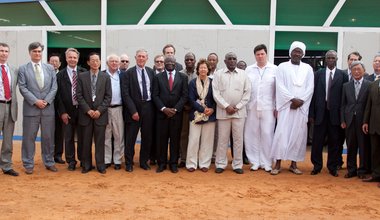05 July 2010 - Final Communiqué from JSR Retreat for the Special Envoys to the Sudan
Second Retreat of the Joint Special Representative of the African Union – United Nations
Mission in Darfur (UNAMID) with Special Envoys for Sudan
El Fasher, North Darfur, Sudan
5 July 2010
Final Communiqué
1. On 5 July 2010, the African Union – United Nations Joint Special Representative (JSR) for Darfur and Head of the African Union ‐ United Nations Hybrid Operation in Darfur (UNAMID), Professor Ibrahim Gambari, convened a Retreat with Special Envoys and representatives of Member States and United Nations partners. Present at the Retreat were the Special Envoys for Sudan of China, Russia, Austria, Canada, Finland, the Netherlands, Sweden, the European Union and the League of Arab States, the AU-UN Joint Chief Mediator for Darfur and the Special Representative of the Secretary‐General in Sudan. The high‐level representatives of France, Japan, the United Kingdom, United States, the African Union Commission, United Nations Secretariat, UNICEF, and of the United Nations High Commissioner for Refugees were also present. The meeting was convened as a follow‐up to the first Retreat the JSR held with Envoys and other partners in Kigali, Rwanda on 27 February 2010.
2. The purpose of the Retreat was to take stock of developments in Darfur since the holding of the first Envoys’ Retreat in Kigali, and to further develop the international community’s shared understanding of, and approach to, the situation in Darfur, in the wider context of Sudan.
3. The participants reviewed developments since their meeting in February 2010, and welcomed the peaceful conduct of national elections in Sudan in April, and the continuing rapprochement between Sudan and Chad. They expressed support for the Mediation and commended its achievements so far, including the increased participation of Darfurians, especially civil society and internally displaced persons and refugees, in the peace process. While welcoming the negotiations between the Government of Sudan and the Liberation and Justice Movement, the participants noted the need for an all‐inclusive process that would lead to the conclusion of a comprehensive peace agreement for Darfur. The participants agreed that it was imperative to reach a lasting solution to the conflict in Darfur before the end of the year, so that peace can take hold throughout Sudan ahead of the crucial referendum on the self‐determination of South Sudan in January 2011, and that national efforts to reach sustainable peace can continue thereafter. All efforts must be made to convince all Movements to come to the negotiation table without delay. In this regard, the participants urged the Government of Sudan to remain engaged and committed to finding a comprehensive solution.
4. With regard to security, the participants expressed grave concern over the deterioration in the situation in Darfur in recent months and the new challenges this has presented in efforts to bring peace, stability and humanitarian response to Darfur. They called on the Government of Sudan and the Justice and Equality Movement to immediately cease hostilities and embrace dialogue. They also expressed concern over increased ethnic violence and the high rates of criminality, including the phenomenon of kidnapping of international workers and attacks against UNAMID personnel, which constitute war crime, and called for the release of all remaining hostages. They condemned in strong terms the criminality and called on the Government of Sudan to take appropriate measures to bring perpetrators to justice and to end impunity. The participants welcomed the increase in UNAMID’s outreach initiatives and protection of civilians. They underscored the need for full humanitarian access and freedom of movement for UNAMID and the humanitarian community. In particular, the meeting stressed the need for the Government of Sudan to lift all restrictions on the use of UNAMID air assets.
5. The participants observed the link between security, sustainable voluntary returns and development, and further underscored the necessity to achieve lasting peace through a comprehensively negotiated settlement. The role of various actors, including United Nations entities, regional organizations and countries in efforts to restore livelihood opportunities was acknowledged. It was underscored, however, that the Government of Sudan has both a leading role and key responsibility to improve security and bring sustainable development to Darfur, and that its role cannot be replaced by external actors. In this context, the participants urged the Government of Sudan to take all necessary steps, including the allocation of appropriate resources to that end. Noting that urbanization is a reality in Darfur, the meeting considered the potential for just and durable solutions, both in terms of returns to areas of origins or integration in an urban context. It recognized the importance of existing joint verification mechanisms to be fully activated.
6. On coordination, the participants commended UNAMID, UNMIS, the Mediation and the AU High‐Level Implementation Panel (AUHIP) for regular interface and productive collaboration. The participants stressed the importance of making full use of existing coordination mechanisms to help the Sudanese achieve durable peace in their country.
7. Participants welcomed the initiative of convening this second retreat of an expanded group of Special Envoys and holding it in El Fasher. They agreed that there should be a follow‐up to the conclusions of the Retreat.
El Fasher, 5 July 2010

Photo: Olivier Chassot/UNAMID
 UN
UN United Nations Peacekeeping
United Nations Peacekeeping


